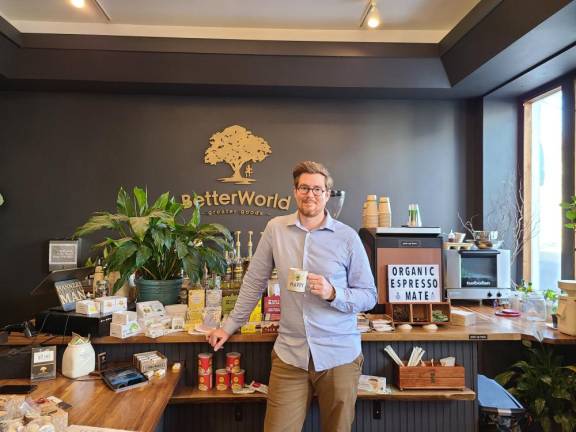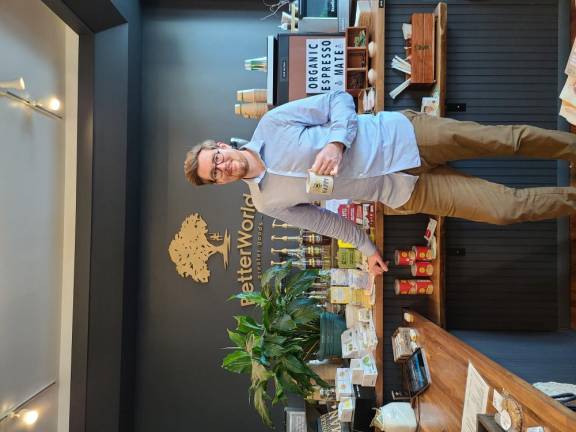A cuppa mindfulness
Aussie Liam Hutchison’s mission: ethical consumption


Aussies Liam Hutchison and his wife, Tegan, always wanted to be more mindful about where their products were coming from. At home in Australia, it simply wasn’t possible to avoid buying items made in China. The couple sold their business, a thriving juice bar, and used the cash to move across the globe to Orange County, N.Y., hoping to create a traveling museum showcasing how products are mass produced. When the pandemic threw a wrench in their plans, the Hutchisons found a new avenue to explore and teach mindful consumption. In downtown Milford, P.A., they opened BetterWorld Store and Café, where they sell ethically made goods and healthy food.
What brought you to the States?
It’s not a standard story, I guess. My wife and I came over from western Australia three years ago now, maybe more. We came over doing humanitarian work, looking to interview Chinese refugees for the purpose of developing a museum. That museum was going to help raise awareness for how our products are made, as many of those who we were interviewing had survived and escaped from labor camps in China. People are being kept in these concentration camp environments, making goods for not only China but the rest of the world. We wanted to get that information out there, because it is seemingly a world where everything is made in China these days.
How did you shift from the museum to opening a café and store?
We were going over those interviews and we were finding that there’s refugees who were coming over to the states, and then finding the products they were making in labor camps on the shelves over here. One lady even found a toy that she was making in a labor camp in a Happy Meal at McDonald’s.
When we came over here, we were quite inspired by how much is still made in America, how much is still produced here or the rest of the free world. When the virus got in the way of carrying on with our museum plans, we started to think about what we could do to help the situation for the people in China, and it always seemed to come back to, really, defunding the tyrannical regime that controls the country, and that would mean starting to boycott Chinese products.
How do you make that work at the store?
You’ve got to put in a little bit more research and put some hours in behind every purchase that you’re making, but we know that there are other people that care about these things...less packaging, less plastic waste, a less disposable culture in general. We wanted to try and layer those factors into what is quite often a missing piece in a sustainable model: taking a more thorough look at where the products are made.
We started to find more and more stuff. So much so that now we have two stores. And we’ve managed to go on without a single product from China, with the only exception of one of our pieces of equipment in the cafe being an electric tea kettle. We couldn’t find it anywhere else in the world. We realized that what we’re achieving here in the store, and the connections we’re making here with the local community, that it was actually even more powerful than potentially the original museum plan.
What would you say the biggest challenge has been?
The more seasonal nature of a small town like Milford, where winters can be quite brutal for small businesses. That was definitely something we’re not used to because our part of Australia doesn’t really have seasons. It’s just hot or really hot. We actually love that we discovered we’re winter people once we got here. That’s definitely been a challenge and also, definitely local politics. We have a rather unique perspective on global politics with the humanitarian work that we were doing. And we actually don’t like politics at all; we don’t align with any of the parties here, we can’t vote, of course, we’re not citizens... So we did find ourselves with some people mistakenly boycotting us because they thought that we were part of one side and not the other. Whereas we’re actually very much just trying to create a space that is free from politics possible these days.
What do you like to do in your free time?
Free time, what’s that? Between being here at the store seven days, and now having a 16-month-old at home, there isn’t a great deal of free time. But we have made some good connections here and have some solid friendships; so catching up with friends and going on hikes when we can.
What’s one simple thing we can all do to make the world a better place?
To boil it down to one: thinking about where the product is coming from. Just checking labels, that’s the key to it all. From there we can always take extra steps towards doing the next thing better, whether that’s ingredients or packaging, or even just creating those products and supporting products that are going to last for a lot longer.